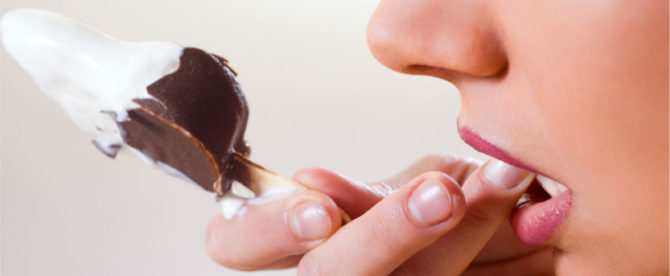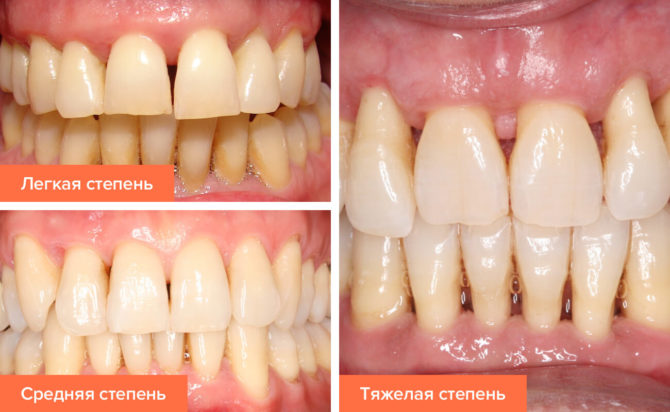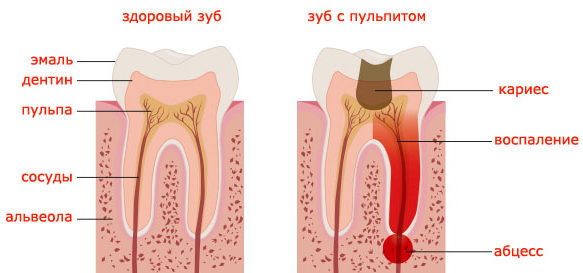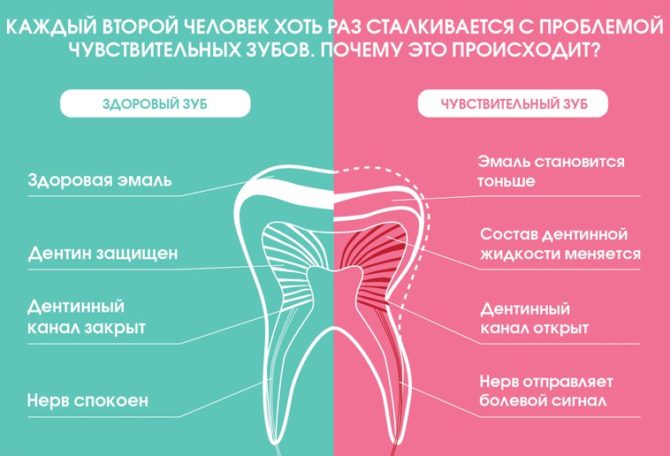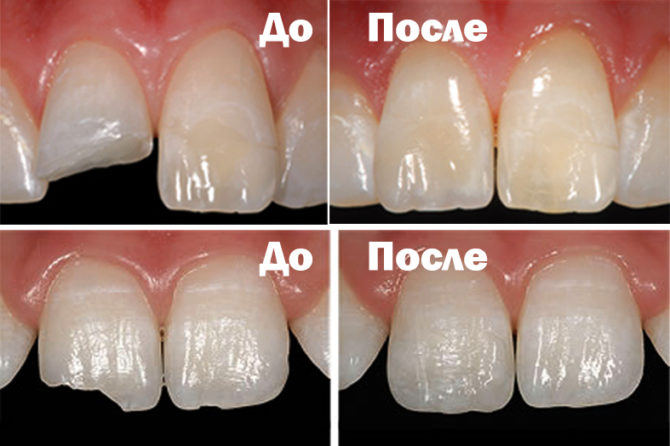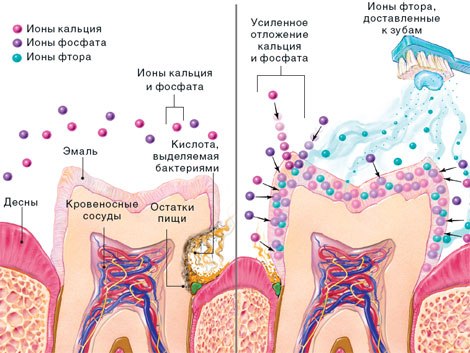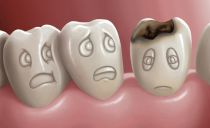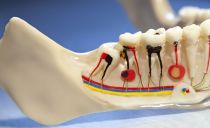Hypersensitivity of the teeth: causes, treatment at home
Do not try to remove the sensitivity of the teeth at home without a visit to the dentist. After all, this is not a harmless symptom or feature of the body, but the real disease is hyperesthesia. The use of folk remedies and medications to get rid of hyperesthesia is permissible only with the permission of the attending physician.
Content
Reasons why teeth become sensitive
Hypersensitivity of the teeth is an ailment whose causes are not fully understood. Hyperesthesia affects people from 30 to 65 years old, most of them are women. In those younger, the teeth are still protected by the dentinal membrane, with age, its layer becomes thinner, which leads to unpleasant sensations. Many older people acquire a false jaw or implants that do not respond to external stimuli, so hyperesthesia is very rare in them.
In pregnant women, high tooth sensitivity is almost always observed and regardless of age. This is due to 3 factors:
- hormonal fluctuations in the body may decrease dentin resistance;
- most of the calcium consumed by a pregnant woman is spent on the formation of the fetus;
- due to frequent vomiting, the acid-base balance in the mouth is disturbed.
These factors lead to thinning of enamel, because of which it begins to respond to temperature fluctuations.
Non-carious factors
Usually people associate any dental problems with caries, but teeth can begin to respond to hot and cold even if they do not have cavities. The reasons that provoke an increase in tooth sensitivity include:
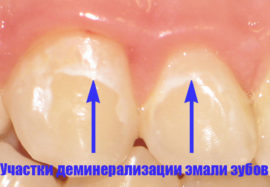 Malocclusion. If the bite is straight, twisted or deep, then the enamel is subjected to too much mechanical stress during chewing, which is why it becomes thinner.
Malocclusion. If the bite is straight, twisted or deep, then the enamel is subjected to too much mechanical stress during chewing, which is why it becomes thinner.- Bruxism. Uncontrolled gnashing of teeth in a dream, often caused by psychoemotional stress.
- The habit of biting nails and other hard objects. Microcracks form on the teeth, which do not have time to recover.
- Smoking. The smoke from cigarettes contains a large amount of substances that destroy enamel and reduce its strength.
- Frequent use of acidic foods: berries, fruits, fruit drinks.
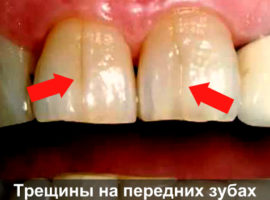 Hormonal disbalance. It is observed during menopause, in adolescence, during pregnancy, with endocrine diseases. You can reduce the effect of hormones with the help of special medicines.
Hormonal disbalance. It is observed during menopause, in adolescence, during pregnancy, with endocrine diseases. You can reduce the effect of hormones with the help of special medicines.- Gastrointestinal diseases.
- Metabolic disorder.
- Unprofessional teeth whitening and iatrogenic causes: the enamel areas on which tartar has formed become thinner, as a result of which the dentinal tubules are exposed, which leads to hyperesthesia.
- Demineralization of enamel.
- The action of ionizing radiation. Even within the framework provided for in Article 15 of 3-FZ.
- Injuries: splits, cracks, broken parts of the crown.
A common cause of hypersensitivity is improper tooth cleaning: the use of brushes with extremely stiff bristles, the abuse of toothpicks and dental floss, the frequent use of toothpastes with whitening abrasive particles that do not bind calcium. Under the influence of the last factor, sensitive tooth enamel is destroyed, the gums hurt and atrophy, and the tooth necks are exposed.
Carious causes
The presence of caries is not a guaranteed cause of hyperesthesia. Painful reactions are associated not with thinning of enamel, but with its destruction as a result of the activity of carious bacteria. In this case, it is not tooth sensitivity that should be treated, but the root cause of its formation - carious cavities, which need to be cleaned and cleaned by filling.
Periodontal disease
Periodontal disease is a lesion of the posterior tissues. Gum prolapse due to the inflammatory process leads to exposure of the tooth neck, covered with cement, which does not have such protective properties as enamel. In severe forms of periodontal disease, tooth sensitivity to products with a pronounced taste may increase.
Pulpitis
If the pulp (nerve) becomes inflamed, the tooth begins to react painfully to external stimuli. Moreover, the pain can last up to several days, accompanied by swelling of the pathogenic region and high fever.
If the increased sensitivity of the teeth is caused by pulpitis, doing anything at home is futile. With pulpitis, you need to clean and fill the dental canals, so if you suspect this disease, you should immediately consult a dentist.
The mechanism of hyperesthesia
As a result of the thinning of the enamel, the dentin channels open. Under them is a pulp, in which there are nerves that are painfully responsive to stimuli. Dentinal tubules begin in the pulp and pass through all dental tissues, except enamel and cement, which protect the dental nerve from external pathogenic factors.
Thinning of the enamel layer and cement leads to the appearance of a pain syndrome. Near the neck of the tooth, the enamel is the thinnest, therefore, even with slight exposure of the tooth root, unbearable pain occurs.
Most often, teeth respond to the following irritants:
- mechanical;
- temperature;
- chemical.
If you remove irritants from the problem area, the pain usually goes away. But it is not always possible to determine the location of open dentinal tubules, since toothache tends to radiate (spread). In addition, the enamel could not be thinned in one tooth, but in several. With the complication of hyperesthesia, it comes to the point that a person can not breathe cold air.
Classification of hyperesthesia
The sensitivity of teeth to external irritants: cold and hot, sour, sweet and salty - can be classified based on the reasons preceding the onset of the disease, as well as the localization and characteristics of its course.
According to the clinical course
There are three degrees of hyperesthesia:
- 1 - tooth response to thermal stimuli;
- 2 - susceptibility of enamel to chemicals;
- 3 - pain appears even when touching a tooth and intensifies at night.
By distribution
Hyperesthesia can affect one or several teeth. Most often, those dental units that are located nearby become sensitive. Local pathology is accompanied by acute pain in the area of one tooth. Most often it occurs due to:
- caries and enamel defects;
- improper treatment and filling of channels;
- ultrasonic or mechanical cleansing of the teeth of tartar and plaque;
- installation of prostheses near the problem area;
- preparation of the tooth before setting the tab.
Hyperesthesia of the entire jaw is usually associated with exposure of tooth necks and dentin on the background of periodontal diseases - periodontal disease, periodontitis.
Strong sensitivity of all teeth can develop with:
- periodontal disease;
- traumatic change in enamel;
- enamel erosion;
- multiple caries;
- hereditary predisposition.
By origin
Hyperesthesia can be caused by thinning of enamel, dentin, cement, or all hard tissues of the tooth. In the latter case, the disease manifests itself in the presence of carious cavities, multiple defects of teeth and erosion. In the first three, pathogenic formations in the oral cavity may not be, since the key cause of increased dental sensitivity are functional systemic disorders in the body.
Diagnosis of hypersensitivity of teeth
To get rid of tooth sensitivity, you need to consult a dentist. Without an accurate determination of the cause of hyperesthesia, all therapeutic actions will be aimed only at eliminating the symptoms of the disease, but the factor that led to their appearance will remain untouched. To prevent this from happening, you first need to find out why the disease has developed, and only then fight it.
First, the dentist examines the oral cavity. During the examination, characteristic anatomical changes are recorded:
- signs of periodontal disease;
- violation of the structure of the teeth;
- a decrease in the volume of hard tissues on the masticatory surface of molars and at the cutting edge of the canines.
After that, the patient is questioned with the specification of the time of day, when there is an intensification of pain.
In acute pulpitis, pain occurs at night, in the absence of an external pathogen and lasts a long time. The temperature is always elevated. And when the enamel layer is thinning, the pain appears only in response to irritants and quickly passes.
After examining the oral cavity and questioning the patient, the doctor says what needs to be done to relieve tooth hypersensitivity syndrome.
What to do if teeth become sensitive
There are several professional methods of dental treatment aimed at reducing their sensitivity, which increased due to open dentinal tubules. For instance:
- open tooth surface is sealed with special composite material;
- open areas of dentin are sealed with varnish with fluorine, which creates an effective protection against external irritants;
- the dental tray is filled with fluorine gel and held in the mouth for about 5-10 minutes, after which it must be removed.
If the teeth become sensitive due to the presence of chips or cracks, it is necessary to restore their integrity using a light-curing composite or remineralizing gels.
Operation
Surgical intervention may be required only if periodontal disease, which led to exposure of the dentin canals, became the cause of the increased dental sensitivity. Surgical actions will be aimed at changing the level of the gums.
Treatment of malocclusion
Bite defects can be cured at any age, but it is better not to tighten, because due to incorrect closing of the jaws, the teeth are gradually deformed and crumble. You can change the bite and reduce the sensitivity of the teeth with the help of special dental structures: plates, braces.
Remineralizing therapy
Remineralization is the saturation of dental hard tissues with minerals. Before the procedure, the tooth surface should be cleaned of food debris, plaque and tartar.
The algorithm for remineralizing medical procedures in the clinic of dentistry:
- professional toothbrushing;
- purification of enamel from saliva and further isolation of teeth;
- drying the treated surface;
- applying a solution of calcium gluconate (from 10%) or Remodent on the tooth surface using a conventional cotton swab;
- processing enamel with sodium fluoride solution.
In the presence of very sensitive teeth that hurt severely and permanently, in addition to local remineralizing therapy, taking calcium gluconate tablets (three times a day) is indicated. The use of a cap with fluoride gel is sometimes prescribed at home.
Re-filling
Sometimes tooth sensitivity occurs after improper treatment of caries. For example, when the dentist installs a poor-quality filling that does not fit snugly or has sharp edges. Because of this, a gap is formed between the pulp and the filling, into which the remains of the products penetrate, which leads to the development of inflammation. In this case, the old seal is removed, and a new one is installed in its place.
Physiotherapy
The treatment of hypersensitivity of the teeth, which arose after their clarification, involves the use of physiotherapeutic procedures:
- Electrophoresis with calcium gluconate, B vitamins, anesthetics, silver, calcium, fluorine and phosphorus.
- Diadynamic therapy - treatment by electric currents.
- The use of sinusoidal currents.
- Ultraviolet radiation, which helps to get rid of the strong sensitivity of the teeth.
How to reduce tooth sensitivity with folk remedies at home
To reduce tooth sensitivity at home, you can use:
- Rinse the mouth with a decoction of oak bark, which increases the protective functions of the body.
- Rinse your mouth with a solution of tea tree oil, which will help get rid of tooth sensitivity and improve the condition of the gums.
- The infusion of the usual medicinal chamomile and burdock, which is used to rinse the mouth or make lotions.
- Eating warm milk. When a tooth aches, it is necessary to hold warm milk in your mouth for several minutes.
Folk remedies will not save you from tooth sensitivity, they can relieve pain only for a while, so do not give up a full dental treatment. Hyperesthesia can be cured only under the supervision of a physician.
Hyperesthesia Prevention
To avoid the development of hyperesthesia, you should understand why the teeth become sensitive, and exclude these factors from your lifestyle. In order not to get hyperesthesia, you should regularly visit the dentist (at least 2 times a year) and less often use whitening pastes with abrasive elements. For brushing, it is better to choose brushes with bristles of medium hardness. The formation of plaque and stone should be avoided.
It is necessary to reduce the amount of consumed acidic berries and fruits that reduce the protective properties of enamel. If possible, foods with a high content of phosphorus and calcium should be consumed, so it is worth including cottage cheese in the daily diet.
Whatever the reasons for the hypersensitivity of the teeth, the dentist should deal with hyperesthesia. It should be remembered that if the sensitivity of the teeth has increased due to another, more serious pathology, getting rid of it is only useless.

